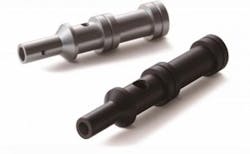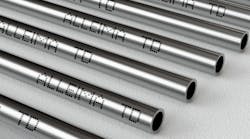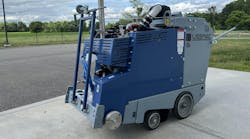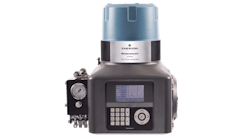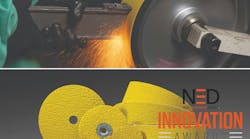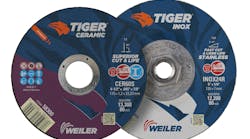CFRP Composite Replaces Aluminum in Oil Control Valve
An Asian automaker has replaced machined aluminum with a unique carbon fiber-reinforced composite in an injection molded oil control valve within the variable valve timing system that controls engine intake and exhaust. The high-performance thermoplastic valve (2-8 valves per vehicle depending on engine size) reduces cost and weight and improves engine response time, hence engine performance.
Sumiploy CS5530 resin is a unique formulation of Sumitomo’s SumikaExcel polyethersulfone (PES) resin plus chopped carbon fiber and a proprietary additive package that boosts wear resistance and dimensional stability. The resulting high-performance composite offers excellent thermal resistance1, good dimensional stability and long-term creep resistance over a broad temperature range, good impact strength, chemical resistance to aromatic hydrocarbons like gasoline, ethanol, and engine oil, inherent flame retardance, and high environmental stress-crack resistance (ESCR). Unlike many other high-temperature thermoplastics that are challenging to mold, Sumiploy CS5530 resin is high-flow, making it easier to mold high-precision 3D geometries in thin walls.
For the oil control valve application, key engineering requirements that Sumiploy CS5530 composite had to pass include ultra-high dimensional accuracy (10.7 mm ± 50 µm or 0.5%), thermal stability from -40 to 150°C, low coefficient of friction, chemical resistance to engine oils, and excellent fatigue strength and creep resistance. Drivers for making the change from machined aluminum to an engineering thermoplastic composite include lowering manufacturing costs, improving engine performance, and lowering weight2. The part has been in commercial use since start-of-production (SOP) in 2015, thus establishing a proven record of performance. Being a thermoplastic, it is fully recyclable (melt reprocessable) at the end of vehicle life.
In addition to automotive use, Sumiploy resins are well suited for use in electrical/electronics and aerospace components to replace machined steel or aluminum as well as other high-performance thermoplastics like polyetheretherketone (PEEK), polyaryletherketone (PAEK), and polyetherimide (PEI). While not critical for this application, Sumiploy resins offer reduced friction against mating surfaces in minimally lubricated environments as well as enhanced functionality and lower manufacturing costs thanks to the parts consolidation from high-precision injection molding. Sumiploy resins are good candidates for metal replacement in applications like oil-control valve pistons, solenoid valve pistons, heating/ventilation/air conditioning (HVAC) vanes and pistons, industrial gears, and non-lubricated bushings and bearings.
1 Glass-transition temperature (Tg) = 225-230°C; distortion temperature under load (DTUL) = 217°C, standard molding temperature = 360°C
2 Specific gravity of composite = 1.56 vs. 2.7 for aluminum
